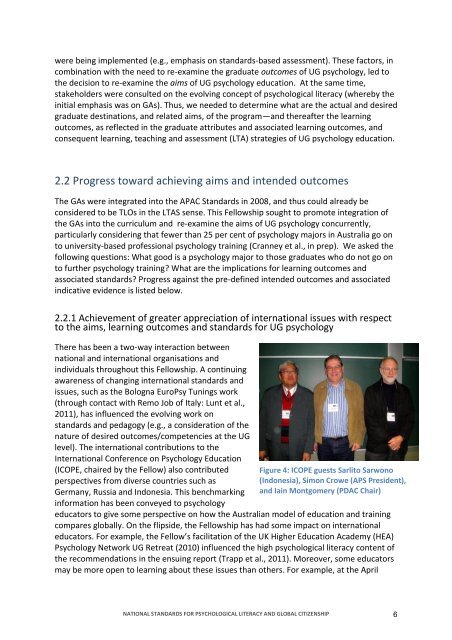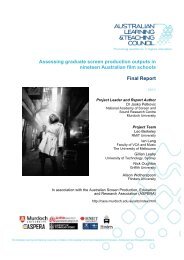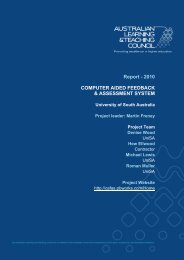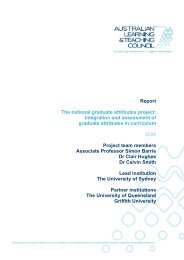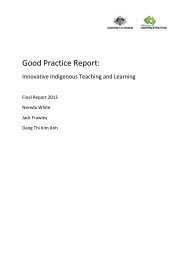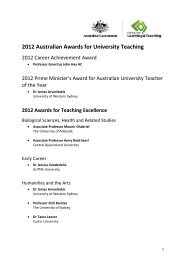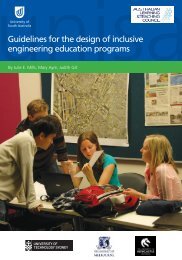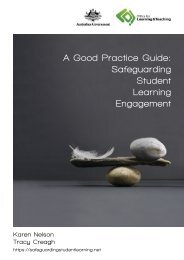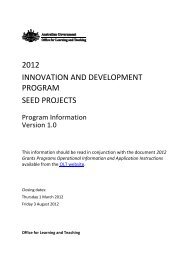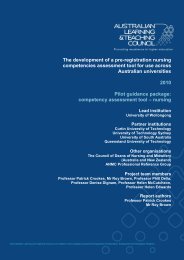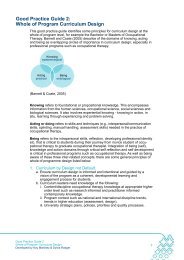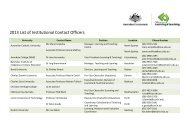national standards for psychological literacy and global citizenship
national standards for psychological literacy and global citizenship
national standards for psychological literacy and global citizenship
You also want an ePaper? Increase the reach of your titles
YUMPU automatically turns print PDFs into web optimized ePapers that Google loves.
were being implemented (e.g., emphasis on <strong>st<strong>and</strong>ards</strong>-based assessment). These factors, in<br />
combination with the need to re-examine the graduate outcomes of UG psychology, led to<br />
the decision to re-examine the aims of UG psychology education. At the same time,<br />
stakeholders were consulted on the evolving concept of <strong>psychological</strong> <strong>literacy</strong> (whereby the<br />
initial emphasis was on GAs). Thus, we needed to determine what are the actual <strong>and</strong> desired<br />
graduate destinations, <strong>and</strong> related aims, of the program—<strong>and</strong> thereafter the learning<br />
outcomes, as reflected in the graduate attributes <strong>and</strong> associated learning outcomes, <strong>and</strong><br />
consequent learning, teaching <strong>and</strong> assessment (LTA) strategies of UG psychology education.<br />
2.2 Progress toward achieving aims <strong>and</strong> intended outcomes<br />
The GAs were integrated into the APAC St<strong>and</strong>ards in 2008, <strong>and</strong> thus could already be<br />
considered to be TLOs in the LTAS sense. This Fellowship sought to promote integration of<br />
the GAs into the curriculum <strong>and</strong> re-examine the aims of UG psychology concurrently,<br />
particularly considering that fewer than 25 per cent of psychology majors in Australia go on<br />
to university-based professional psychology training (Cranney et al., in prep). We asked the<br />
following questions: What good is a psychology major to those graduates who do not go on<br />
to further psychology training? What are the implications <strong>for</strong> learning outcomes <strong>and</strong><br />
associated <strong>st<strong>and</strong>ards</strong>? Progress against the pre-defined intended outcomes <strong>and</strong> associated<br />
indicative evidence is listed below.<br />
2.2.1 Achievement of greater appreciation of inter<strong>national</strong> issues with respect<br />
to the aims, learning outcomes <strong>and</strong> <strong>st<strong>and</strong>ards</strong> <strong>for</strong> UG psychology<br />
There has been a two-way interaction between<br />
<strong>national</strong> <strong>and</strong> inter<strong>national</strong> organisations <strong>and</strong><br />
individuals throughout this Fellowship. A continuing<br />
awareness of changing inter<strong>national</strong> <strong>st<strong>and</strong>ards</strong> <strong>and</strong><br />
issues, such as the Bologna EuroPsy Tunings work<br />
(through contact with Remo Job of Italy: Lunt et al.,<br />
2011), has influenced the evolving work on<br />
<strong>st<strong>and</strong>ards</strong> <strong>and</strong> pedagogy (e.g., a consideration of the<br />
nature of desired outcomes/competencies at the UG<br />
level). The inter<strong>national</strong> contributions to the<br />
Inter<strong>national</strong> Conference on Psychology Education<br />
(ICOPE, chaired by the Fellow) also contributed<br />
perspectives from diverse countries such as<br />
Germany, Russia <strong>and</strong> Indonesia. This benchmarking<br />
in<strong>for</strong>mation has been conveyed to psychology<br />
Figure 4: ICOPE guests Sarlito Sarwono<br />
(Indonesia), Simon Crowe (APS President),<br />
<strong>and</strong> Iain Montgomery (PDAC Chair)<br />
educators to give some perspective on how the Australian model of education <strong>and</strong> training<br />
compares <strong>global</strong>ly. On the flipside, the Fellowship has had some impact on inter<strong>national</strong><br />
educators. For example, the Fellow’s facilitation of the UK Higher Education Academy (HEA)<br />
Psychology Network UG Retreat (2010) influenced the high <strong>psychological</strong> <strong>literacy</strong> content of<br />
the recommendations in the ensuing report (Trapp et al., 2011). Moreover, some educators<br />
may be more open to learning about these issues than others. For example, at the April<br />
NATIONAL STANDARDS FOR PSYCHOLOGICAL LITERACY AND GLOBAL CITIZENSHIP 6


